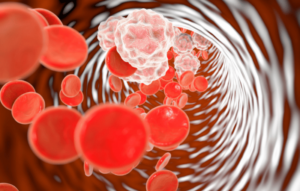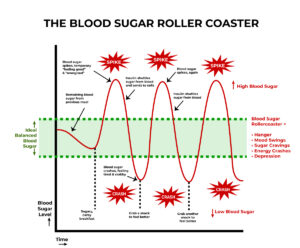So many guys find themselves strangely exhausted by midday, struggling to stay focused throughout the day, or constantly reaching for snacks in attempts to keep their energy up. If this sounds like you, you’re not alone – and your blood sugar might be to blame. Blood sugar regulation isn’t just a concern for people with diabetes; it’s a crucial factor in your overall health, affecting everything from your mood and mental clarity to your long-term risk of chronic diseases.
For men who are leading busy lives, trying to stay fit, or struggling physically, mentally, or emotionally, managing blood sugar levels is especially important. In our fast-paced world, packed with convenience foods and stressful schedules, it’s easy to fall into habits that wreak havoc on your blood sugar without even realizing it. The good news? By making a few simple changes – like prioritizing protein, incorporating complex macronutrients, and avoiding refined carbohydrates in isolation – you can keep your blood sugar stable, boost your energy, and protect your health.
Here’s why you need to manage your blood sugar better and how you can start today.
Why Managing Blood Sugar is So Essential
Blood sugar management isn’t just another trending health topic; it’s actually fundamental to our overall well-being. When your blood sugar spikes and crashes throughout the day, it doesn’t just leave you feeling drained and irritable – it also puts your body under constant stress. This can lead to a host of immediate issues, like poor concentration and low energy, and over time, it increases your risk of more serious conditions like diabetes, heart disease, and metabolic syndrome.
For men, stable blood sugar is crucial not only for preventing these health risks but also for maintaining peak performance and vitality. Blood sugar swings can directly impact your physical capabilities, making it harder to build muscle, recover from workouts, or even stay mentally sharp in the office. Your body needs a steady supply of energy, and wild blood sugar fluctuations sabotage that.
The bottom line? If you’re looking to stay strong, focused, and healthy, managing your blood sugar is key. By understanding the dangers of blood sugar spikes and learning how to keep your levels steady, you can take control of your health and improve your daily performance in every area of your life.
The Hidden Dangers of Blood Sugar Spikes
So, what exactly happens when your blood sugar spikes? Basically this: you eat a muffin or grab a sugary drink, and within minutes, your blood sugar surges. Your body responds by releasing a flood of insulin, the hormone designed to help bring that sugar back down to safe levels. But here’s the catch – this rush of insulin often causes your blood sugar to plummet just as quickly as it spiked, leaving you feeling exhausted, foggy, and craving even more sugar to get back on track.
This constant rollercoaster of spikes and crashes can lead to more than just temporary discomfort. Over time, repeated blood sugar spikes contribute to insulin resistance, a condition where your cells become less responsive to insulin’s effects. This not only makes it harder for your body to regulate blood sugar, but it also paves the way for weight gain, inflammation, and eventually, type 2 diabetes.

And it’s not just your waistline or your risk for chronic diseases at stake – high blood sugar levels can damage blood vessels, increase oxidative stress, and even accelerate the aging process. This is unfortunately pretty common and a lot of guys are unknowingly fueling this cycle by eating carbohydrates, especially refined carbohydrates, in isolation or reaching for quick-fix sugary snacks throughout the day.
carbohydrates, in isolation or reaching for quick-fix sugary snacks throughout the day.
The good news is that you can stop this cycle before it starts. By making strategic dietary changes, like combining protein, healthy fats, and complex carbohydrates, you can help keep your blood sugar levels steady and avoid the hidden dangers of these unhealthy spikes. Up next, we’ll explore how to harness the power of these nutrients to keep your blood sugar – and your health – in check.
How Protein and a Balanced Diet Can Help
If you’re serious about managing your blood sugar, one of the most effective strategies is to rethink what’s on your plate. Rather than solely focusing on reducing carbs, you should work on balancing your meals with the right mix of nutrients – starting with protein, healthy fats, and complex carbohydrates.
Leveraging Protein
Protein isn’t just for building muscle; it plays a vital role in stabilizing your blood sugar levels. When you eat protein-rich foods like chicken, beef, fish, eggs, or legumes, they slow down the digestion process, leading to a more gradual release of glucose into your bloodstream. This not only prevents those dramatic spikes and crashes but also keeps you feeling fuller and more satisfied for longer.
sugar levels. When you eat protein-rich foods like chicken, beef, fish, eggs, or legumes, they slow down the digestion process, leading to a more gradual release of glucose into your bloodstream. This not only prevents those dramatic spikes and crashes but also keeps you feeling fuller and more satisfied for longer.
Complex Carbohydrates
Not all carbs are created equal. Simple carbohydrates like white bread, pastries, and sugary snacks – are quickly broken down into glucose, causing a rapid rise in blood sugar. In contrast, complex carbohydrates, such as whole grains, vegetables, and legumes, take longer to digest. They provide a more steady and sustained release of energy, helping you avoid the highs and lows of blood sugar spikes.
Healthy Fats
Don’t overlook the importance of fats in your diet. Healthy fats, like those found in healthy meats, avocados, nuts, seeds, and olive oil, help slow the absorption of sugar into your bloodstream. This creates a more balanced blood sugar response, reducing the likelihood of spikes. Plus, incorporating these fats can enhance the flavor and satisfaction of your meals, making it easier to stick to a healthier eating plan.
By prioritizing protein, choosing complex carbohydrates, and incorporating healthy fats, you’re setting your body up for better blood sugar control and sustained energy. All this is to combat the one big mistake that’s causing so many issues for people – eating carbs in isolation. Let’s break down why this is so problematic and how you can easily avoid it.
Why Eating Carbs in Isolation is Problematic
One of the most common dietary mistakes that people make is eating carbohydrates in isolation – grabbing a bagel for breakfast, snacking on a bag of pretzels in the afternoon, or reaching for a sugary drink when energy dips. While these might seem like convenient choices, they set the stage for a blood sugar rollercoaster that can cause some serious health problems.

When you consume carbohydrates without pairing them with protein or healthy fats, your body digests them rapidly, causing a quick rise in blood sugar levels. This quick surge triggers a large release of insulin, which then causes your blood sugar to drop just as fast. The result? A cycle of energy crashes, increased hunger, and cravings for more quick-fix carbs. This is why you might find yourself feeling tired, cranky, and reaching for more snacks just a couple hours after your last meal.
Real-Life Examples of This Mistake
Think about a typical breakfast of a bowl of cereal or toast with jam. Without protein or fat to balance it out, this meal will likely lead to a spike in your blood sugar, setting the tone for unstable energy and mood throughout the day. Similarly, having a soda on its own just when you’re thirsty can cause a quick rise and fall in blood sugar, leaving you feeling drained and unsatisfied.
The Cycle of Cravings and Energy Crashes
This pattern of eating carbs in isolation leads to a vicious cycle. After the initial sugar rush, your body experiences a crash, prompting you to crave more sugar or simple carbs to bring your energy back up. Over time, this cycle can lead to weight gain, insulin resistance, and a host of other metabolic problems that will break down your health and vitality over time.
rush, your body experiences a crash, prompting you to crave more sugar or simple carbs to bring your energy back up. Over time, this cycle can lead to weight gain, insulin resistance, and a host of other metabolic problems that will break down your health and vitality over time.
The key to breaking this cycle is simple: try to always pair carbohydrates with something protein-focused (which will usually also come with fat). By doing this, you slow down the digestion process and promote a more gradual release of glucose into your bloodstream, keeping your energy levels stable and reducing cravings.
Lifestyle Tips for Blood Sugar Stability
Managing your blood sugar isn’t just about what you eat; it’s also about how you live. Your daily habits, from how much you move to the quality of your sleep, play a crucial role in keeping your blood sugar levels balanced. Here are some lifestyle changes that can also help stabilize your blood sugar and fortify your overall health.
Stay Active
Physical activity is one of the most effective ways to improve insulin sensitivity and help your body regulate blood sugar. Whether it’s a brisk walk, a strength training session, or playing your favorite sport, regular exercise helps your muscles use glucose more effectively, reducing blood sugar spikes. Aim for at least 30-60 minutes of moderate exercise most days of the week to keep your blood sugar in check and enhance your overall health.
glucose more effectively, reducing blood sugar spikes. Aim for at least 30-60 minutes of moderate exercise most days of the week to keep your blood sugar in check and enhance your overall health.
Prioritize Sleep and Hydration
Quality sleep is a game-changer for blood sugar management. Poor sleep can increase insulin resistance, making it harder for your body to keep blood sugar levels stable. Aim for 7-9 hours of restorative sleep each night to support your metabolic health. Likewise, staying well-hydrated is essential – water helps your kidneys flush out excess blood sugar, and even mild dehydration can raise blood sugar levels. Make sure to drink water consistently throughout the day.
Monitor Your Responses
Pay attention to how your body responds to different foods and activities. Consider using a glucometer or a continuous glucose monitor (CGM) to get a clearer picture of how your blood sugar reacts to various meals, snacks, and lifestyle choices. Understanding your personal blood sugar patterns can help you make more informed  decisions about what to eat and how to live.
decisions about what to eat and how to live.
By incorporating these lifestyle habits alongside smarter eating strategies, you’ll be well on your way to managing your blood sugar more effectively and enhancing your overall health and well-being.
Closing Thoughts
Managing your blood sugar is just as much about preventing future health problems as it is about optimizing how you feel and perform every single day. By taking control of your blood sugar levels through smarter eating habits, like incorporating protein and healthy fats with every meal and avoiding carbs in isolation, you can break free from the all-too-common cycle of energy crashes, cravings, and fatigue.
Remember, it’s not about perfection but making small, sustainable changes that lead to big improvements over time. Combine these dietary adjustments with an active lifestyle, quality sleep, and good hydration, and you’ll set yourself up for better health, more vitality, and better performance in every aspect of your life.
Don’t let unstable blood sugar hold you back any longer lads. Start making these simple changes today, and feel the difference in your energy, focus, and overall well-being.








